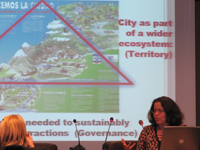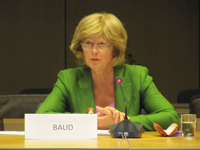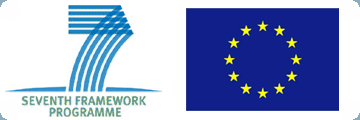Chance2Sustain Expert RoundtableMay 27, 2010; Bonn/Germany
This expert roundtable brought members of the Chance2Sustain project together with stakeholders working on urban sustainable development and cooperation in Germany. The goal was to inform on the project and to discuss the project, its aims and the policy advice to be produced for local stakeholders in the fast-growing cities of the global south. The expert meeting was hosted by Carolin Bender, on behalf of the German Federal Ministry for Economic Development Cooperation (BMZ) and Thomas Lawo, the European Association of Development Training and Research Institutes (EADI). Emphasizing the importance of urban issues in the context of development cooperation, Carolin provided an overview of projects implemented by the BMZ in this field (210 projects in more than 50 countries, with a portfolio of 2.1 billion EUR). Explaining the role of EADI as a platform for coordination and facilitation within the Chance2Sustain project, Thomas suggested that the expert roundtable represented a very good opportunity to share experiences among organisations implementing similar programmes. |
|
|
Project presentationsIsa Baud, Chance2Sustain Scientific Coordinator, chaired the roundtable starting with an in-depth presentation of the project, including the main research question (how can participatory knowledge management contribute to more sustainable urban development) and scientific goals/approaches used in the implementation process. Some of the main activities planned were also stated: initiating research on specific topics, including country workshops with local stakeholders and policymakers; issuing publications through Working Papers, country reports/thematic reports and final collective publication; yearly conferences linking researchers and policymakers in the countries concerned; policy briefs and opinion papers for policymakers and wider lay audience; start and end conference in South Africa and Brussels promoting attention for objectives and results to policymakers, civil society and research communities.
Dianne Scott, representing the University of KwaZulu-Natal, provided an overview of the work carried out by the team in South Africa. The presentation included the core research question (how to conceptualise and frame fast growing cities in the ‘developing world’ in relation to sustainability), a comparative analysis between the cities of Durban and Cape Town and aspects related to participatory spatial planning. Other issues raised referred to the impact of the political dominance of the government in South Africa on the participation of local stakeholders and to the actual beneficiaries of the project. According to Dianne, civil society organisations working in urban development are quite open to cooperation, including local councils that are very resourceful in understanding how things work locally. At the same time, should the research carry policy implications, municipalities of both cities and participatory planning forums will become major project beneficiaries.  Liliana Miranda Sara continued the presentation of the project by introducing two case studies of the cities of Lima and Arequipa in Peru. Considering that Peru is the ninth of the ten most vulnerable countries affected by the impact of climate change on water availability, the main focus of the research team is on water concerns and other generated risks (i.e. relocation of people, reduced hydrogen power, increased conflicts over water use and simultaneous increase in demands for water and energy). Territorial overdivision of cities and institutional capacity weakness determined by the lack of financial resources, knowledge and awareness of the impact of climate change and the lack of policies, instruments and strong institutions for regional/city management are some of the key challenges faced by the cities. Hence, the final purpose of the project will be to identify how (and with whom) to develop an integrated and equitable City Water (Risk) Policy and Governance Strategy, to clarify who (and how) takes the necessary decisions, and which resilient capacities should be enhanced in order to implement the strategy.
In order to facilitate exchange of experiences with representatives from similar projects, the roundtable proceeded with a presentation by Andrea Koch-Kraft on behalf of the German Aerospace Center. Andrea provided an overview of the programme on Research for Sustainable Development of Tomorrow’s Megacities, with the main phase on energy- and climate-efficient structures in urban growth centres. The key goals of the BMBF research priority consist in research, planning, development and implementation of solution-oriented and integrated innovation strategies for future Megacities; technical and non-technical innovations for the establishment of energy- and climate-efficient structures; enabling cities to increase the sphere and yield of efficiency in energy production/distribution/utilization; and showcasing, that resource-consumption and greenhouse gas-emission by energy-using sectors can prospectively be reduced in terms of sustainability. These aim to be achieved through a participatory approach, using multidimensional research themes based on specific demand areas (‘prevention’ instead of mere ‘diagnosis’) and other pilot measures. Two thematic foci were mentioned, the first including the cities of Lima, Casablanca, Addis Ababa, Gauteng and Karaj/Teheran, while the second being focused on Hyderabad, Urumqi, Shanghai and Ho Chi Minh City. Andrea concluded by inviting participants to the BMBF International Megacities Conference in Essen, Germany, during October 11-13, 2010, where outcomes and ‘hidden’ success stories of sustainable development on the ground will be addressed.
The last presentation was delivered by Ulrich Mans, PhD Candidate at the University of Amsterdam. Ulrich provided an insight on entrepreneurial green cities by investigating the advance of renewable energy in emerging market cities. Main steps in the research process were presented, covering global city networks, renewable energy and ‘going green’ trends, as well as entrepreneurial green cities (Cape Town study case). Some of the triggered research questions relate to the medium-size cities that emerge as centres of the global renewable energy sector, to what extent these cities combine the two ‘going green’ trends (green-concsious growth and green-driven growth), what strategies municipalities follow, how much autonomy they possess, as well as the challenges faced during the process. Final recommendations In the last round of discussions, a few issues were brought up by the representative of the GTZ, Daphne Frank, which were reflected upon by the Chance2Sustain project team. Considering the broad research aspects covered by project, it was recommended that a couple of key questions are designed for each city involved. As the entire programme pursues a comparative approach, meaning that similar issues will be addressed in different cities, a common analysis framework would be built during the research process. Other suggestions were: assuring a similar understanding of terms and definitions used (ex. ‘space’, ‘territory’, ‘knowledge management’), considering that different cultures imply a different interpretation of the applied terminology; taking into account issues such as transparency and local power politics in order to overcome corruption practices and steer local, democratic community participatory processes; following an action-oriented approach in order to produce concrete, effective and scientific results at the same time; facilitating an ambitious research process by testing new methods and by combining short term outcomes with a long term perspective. |
Presentations by SpeakersIsa Baud: Urban Chances - City growth and the sustainability challenge. (powerpoint)
Liliana Miranda Sara: Resilience to Climate Change: City Water (risk) Governance; Cases of Lima and Arequipa, Peru (powerpoint)
Dianne Scott: Chance2Sustain presentation UKZN (powerpoint)
Ulrich Mans: Entrepreneurial green cities (powerpoint)
Andrea Koch-Kraft: Megacities - Research for the Sustainable Development of Tomorrow’s Megacities (powerpoint) Videos |

